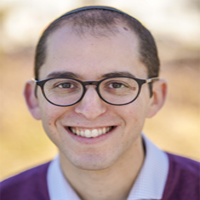Sol Adelsky
Credentials
Finances
Licensed in Israel
Licensed Abroad
- Raanana
Sol Adelsky
 Verified
Verified
Credentials
Child/Adolescent Psychiatrist, Psychiatrist
MD
Finances
None
N/A
ABOUT THE THERAPIST
I am a U.S.-trained and U.S. board-certified child, adolescent, and adult psychiatrist, who made aliyah from Boston in 2018. I am recognized as a מומחה in both adult psychiatry and child and adolescent psychiatry in Israel. I have a private practice in Ra'anana, where I see children, adolescents, and adults, including gap year and yeshiva/seminary students, as well as young professionals. I am trained in a number of treatment modalities including psychodynamic therapy, CBT (Cognitive Behavioral Therapy), DBT (Dialectical Behavioral Therapy), family therapy, and medication management.
I take an integrative, patient-centered approach to treatment, designing a treatment plan that is consistent with your values and priorities. I take a mindful and careful approach to the use of medications, when indicated, and utilize them in conjunction with other tools such as psychotherapy. I work closely with other clinicians involved in the care of my patients, collaborating regularly with therapists, family members, and other specialists.
I completed my residency in adult psychiatry followed by a fellowship in child and adolescent psychiatry at the Harvard Medical School-affiliated Cambridge Health Alliance. Throughout my training, I was involved in a variety of activities mostly around the topics of quality improvement, innovation, and education, and have been fortunate to present my work at national conferences and in academic journals. During my training, I worked with college and graduate students at MIT’s Mental Health Center, and had opportunities to train at McLean Hospital and The Meadows. I received my B.A. with honors from the University of Michigan, where I also completed a Master of Public Policy degree. I graduated from medical school at Brown University, where I was inducted into both the Alpha Omega Alpha and Gold Humanism Honor Societies.
I am actively involved in building a community of English-speaking psychiatrists in Israel, and serve on the Aliyah Committee of Get Help Israel. While I am based in Israel, I continue to maintain a part-time staff appointment at Cambridge Health Alliance, where I am involved in academic projects, and teach and supervise Harvard medical students, residents, and fellows. I look forward to meeting and working together with you.
*As of February 1, 2023, the current wait time for a new patient appointment is approximately 1-2 months.*
QUALIFICATIONS
MD
Brown University
2013
Degree
MDEducation
Brown UniversityYear of Graduation
2013Years in Practice
11
Psychiatry License Number
1-38552
LICENSED ABROAD
License Category
PsychiatristLicense Number
265473 MassachusettsADDITIONAL CREDENTIALS
Board Certification in Adult Psychiatry by the American Board of Psychiatry and Neurology (2017)
Board Certification in Child and Adolescent Psychiatry by the American Board of Psychiatry and Neurology (2018)
מומחה in Adult Psychiatry (2019)
מומחה in Child & Adolescent Psychiatry (2020)
DISTANCE COUNSELING
None
PRIMARY SPECIALTIES
Anxiety / Panic
Attention Deficit Hyperactivity Disorder (ADHD)
Mood Disorders
ADDITIONAL SPECIALTIES
N/A
CLIENT FOCUS
Population
Children
Adolescents
Adults
Families
Languages Spoken
Hebrew
English
TREATMENT APPROACH
Cognitive Behavioral Therapy (CBT)Cognitive Behavioral Therapy (CBT) is a type of psychotherapy that focuses on how one's thoughts, feelings and behaviors are connected and can be changed. It is based on the idea that how we think (cognition) and how we feel (emotion) can influence how we behave. CBT helps people identify and challenge distorted thinking and replace it with more balanced thinking, leading to improved mood and behavior. ‘Homework’, usually containing practical writing exercises, is often completed by the client between sessions to reinforce the therapy. Examples of tools that practitioners often use are journaling, challenging beliefs, and mindfulness.
Dialectical Behavior Therapy (DBT)Dialectical Behavior Therapy (DBT) is a type of cognitive-behavioral therapy developed by Marsha Linehan to help people learn to better manage and cope with emotions and stress. It focuses on developing skills and strategies to help regulate emotions, improve relationships and communication, and reduce self-destructive behaviors. Through DBT, people learn to identify and modify unhealthy thoughts and behaviors, while also learning to accept and validate their own feelings. DBT teaches skills to help individuals become aware of and accept and regulate their emotions, tolerate distress, and improve interpersonal relationships.
Family Systems TherapyFamily Systems Therapy is an approach to psychotherapy that emphasizes the importance of understanding how the family functions as a whole, and how individual family members interact and affect one another. It focuses on how family dynamics, such as communication patterns, roles, and power dynamics, shape behavior, and how changing these dynamics can lead to positive change. Family Systems Therapy is a collaborative approach, where the therapist works with the family as a whole to identify and address areas of conflict and distress.
Psychodynamic TherapyPsychodynamic therapy is a form of therapy that focuses on the unconscious mind and how it affects behavior. It works to help people understand and work through past experiences and feelings that may be causing difficulties in the present. This type of therapy encourages individuals to explore their emotions, relationships, and behaviors in order to gain insight into their current difficulties. It can help individuals better understand themselves and their motivations, and gain insight into how past events have impacted their current lives. People tend to develop defense mechanisms when faced with challenges in life. Defense mechanisms may keep painful feelings, memories, and experiences in the unconscious. A few common defense mechanisms include: denial, repression, and rationalization. Psychodynamic therapists encourage people to speak freely about their emotions, desires, and fears. Being open may help uncover vulnerable feelings that have been pushed out of conscious awareness. According to psychodynamic theory, behavior is influenced by unconscious thought. Once painful feelings are brought forth and processed, the defense mechanisms are no longer needed and a person in treatment can start changing unhelpful patterns when coping with life’s challenges.
SERVICES OFFERED
Individual Therapy
Family Therapy
Medication Management
Psychiatric Evaluation

 Verified
Verified

